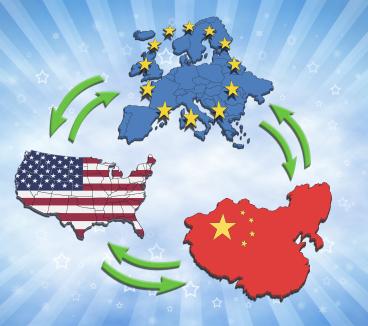
The 18th National Congress of the Chinese Communist Party (CCP) sat in early November 2012 to clinch the transition in power from Hu Jintao and Wen Jiabao. Xi Jinping replaces Hu Jintao as general secretary of the CCP and chairman of the Central Military Commission and is expected to become China’s next president. Li Keqiang is re-appointed to the Politburo Standing Committee of the Communist Party of China and is expected to replace Wen Jiabao in the premiership. Both presidency and premiership roles will only be officially confirmed by the National People’s Congress, normally to be held in March 2013.
They will form the core membership of the Politburo Standing Committee which has been reduced from nine (the number decided in 2002) to seven on the grounds that a smaller Standing Committee can operate more efficiently. Five members of the former Standing Committee have stood down, as have about 70 percent of the membership of the Central Military Commission and the Executive Committee of the State Council. The names being mentioned for the top posts in 2017 are Wang Yang and Li Yuanchao, both considered to favour a more politically "liberal" stance.
But the transition was also accompanied by prolonged wrangling by insider groups of "princelings"- heirs to the 1949 Communist aristocracy - who exert extensive political patronage, client relations, guanxi and money to influence outcomes. In his final report to the Party Congress, Hu Jintao referred obliquely to the scandal in Chongqing surrounding the Bo Xilai affair, to the effect that corruption had the potential of bringing down both party and state. Bo Xilai, a former Politburo member, is a son of one of the eight CCP "immortals" and lived the high life, while seeking to base his personal campaign for key posts on harassing businesses in Chonqing in the name of Maoist populism. All of these manoeuvrings and scandals were covered in the foreign press, not least the rumours that Premier Wen Jiabao had amassed a family fortune reported to be around US$2 billion dollars on his prime minister's salary.
Surrounded by Buzz
Whether or not these reports are true, it is the nature of dictatorships to conceal information. They are always surrounded by a buzz of unconfirmed rumours, more or less mixed with fact. More worrying for the outgoing leadership has been the evident signs of popular discontent over rising inequalities; severe environmental degradation; extortion and land grabs organised by local officials in league with party banks, construction companies and local steel operators; and not least, the lack of local accountability. It is in these local battles for public support that the future of the regime lies. As income levels rise, this will become an ever greater challenge to an unreformed Communist system.
The old leadership has presided over China's emergence as a great power on the world scene. In 2002, China joined the World Trade Organisation (WTO). By 2010, it had overtaken Japan as the world's second largest economy. Labour productivity in manufacturing over the period rose at double digit rates. But as China's world status rose, the leadership began to act as if the U.S. was seeking to break its ascent. There is some truth to the observation, but it is also the case that the U.S. is a wide open market for goods made in China. China is the EU's number one target for anti-dumping cases in the WTO, but is also China's prime export market and a major source of foreign direct investment. Its neighbours are wary of the more bombastic patriotism that has been in evidence over sea claims, in the Himalayas, and in the island disputes with Japan. For months after the overthrow of the Arab dictatorships, the word "jasmine" was blocked on the Chinese internet.
The old leadership in short was a worried one. The challenge of the new leadership is to defuse tensions with neighbours and to liberalise the regime politically. That is a very tall order.
-
View Comments
-
Leave a Comment



No comments yet.